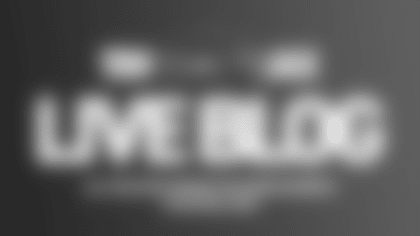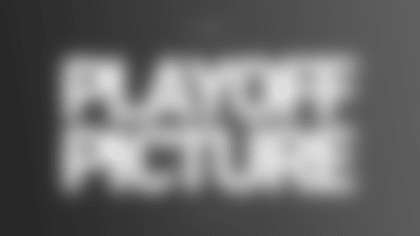Join *Jaguars Inside Report *Senior Editor Vic Ketchman as he tackles the fans' tough questions.
Robert Asendorf from Jacksonville:
Why has Kevin Hardy not restructured his deal, yet? I would think the fear of getting cut would force him into it, seeing as there is no way he would get a contract worth $2.2 million on the free-agent market with the amount of linebackers still unemployed. Couldn't they make a dummy deal that could clear up a million or so off the cap by adding a year and giving a signing bonus, then promise to cut him next spring?
Vic: The Jaguars are attempting to re-structure Kevin Hardy's current contract, however, paying him an additional bonus is a stumbling block because a portion of it would have to be declared this season, thus reducing the cap relief, and the remainder of that bonus would have to be declared next season, when Hardy would likely not be with the team. The Jaguars must be just as concerned about next year's salary cap, since it is already stuffed with re-structured contracts from this past winter. Re-structuring a deal with Hardy is touchy stuff. Though the Jaguars need relief for this season, they don't need to assume amortization for a player who won't be on their roster next season. That's why a long-term contract is preferable. Of course, Hardy knows the Jaguars are thin at linebacker for this season, which gives him leverage in negotiations. It's a cat and mouse game. Cutting him is an option, but it won't make the Jaguars a better team this year.
Vijay Oberoi from Toronto, Canada:
With Jonathan Quinn having a great performance in NFL Europe, isn't there a chance teams are interested in him? Do you think Tom Coughlin will try to trade him before the season starts?
Vic: Jonathan Quinn certainly created value for himself, but interest in Quinn may not be significant until he becomes an unrestricted free agent next winter, when any team would be free to sign Quinn without having to compensate the Jaguars. If a team traded for him now, they would lose a draft choice and still have to sign Quinn to a new deal before free agency began, or risk losing him. By waiting, they would gain more information on Quinn's ability and level of development. Quarterback is the one position at which teams don't want to make a mistake. From the Jaguars' standpoint, trading Quinn now would provide little in the way of salary cap relief, probably wouldn't yield much in the way of a draft pick, and certainly wouldn't make this year's team stronger. In personnel decisions such as Quinn poses, usually the best course of action is to watch and wait. Circumstances can change very quickly.
Susan Markiw from Fernandina Beach, FL:
Two seasons ago, with the addition of Carnell Lake to the secondary, the Jaguars defense showed marked improvement. With Carnell's absence last year, there seemed to be a significant drop-off in the secondary's coverage. Do you feel his influence and play will improve the defense and help the rookies make the transition to the NFL?
Vic: The Jaguars clearly need the leadership a player of Carnell Lake's experience and stature offers, but they need his ability to play football above all. If he is completely recovered from the foot injury that kept him out of action last season, Lake will greatly improve the Jaguars defense this season.
Matt Kochan from Ponte Vedra Beach, FL:
It is being predicted that next year's offseason will be just as bad, if not worse, as this season, as far as the cap surplus goes. With this problem, will the Jags be able to deal with Fred Taylor's contract needs? After the Jags committed to Mark Brunell this offseason, does that leave much more room for them to commit to Fred?
Vic: Fred Taylor is under contract to the Jaguars through the 2003 season. Until then, the Jaguars don't have to do anything to improve Taylor's contract, but they understand his value to the team exceeds the value of his contract, and they want to make every effort to improve Taylor's contract and lengthen its terms of service. That'll be difficult, especially if Taylor has a big year this season. If that happens, Taylor's value may exceed what the Jaguars could find in the way of cap room. Either way, he's committed to play for the Jaguars for three more seasons.
David Nelson from Jacksonville:
I am so wrapped up in my Jaguars that my wife refuses to have the "J" word mentioned around her. In my heart, I know we have the right coach, the right quarterback, etc. So, what are we missing? Is it attitude? Is it heart? Is it cohesiveness? I just don't get it.
Vic: A couple of years ago, when the Jaguars collapsed in the second half of the AFC title game, I didn't get it, either. However, it's much easier to understand what the problems are this season. This is a team with star players, but this is also a very thin roster. The Jaguars have major uncertainty on the right side of their offensive line. There is no clear-cut candidate for the fullback job. Older players such as Carnell Lake and Hardy Nickerson must return to complete health for the defense to be improved. Rookies such as Marcus Stroud and Maurice Williams are being counted on to become major contributors immediately. On top of all of this, the Jaguars have no salary cap room to correct some of these woes. For the Jaguars to become playoff contenders this season, all of the chips have to fall into place. The core players have to have the best seasons of their careers, the rookies have to offer immediate depth, and injuries must be at a minimum. That's my take on the situation.
Skeeter Robie from Jacksonville:
You may remember prior to the 1999 preseason I wrote to "After Further Review" concerning the NFL's "no noise-maker" policy. I had suggested to Mr. Dan Connell, Jaguars vice president of marketing, that the Jaguars and some of their major sponsors hand out mini-megaphones as one of the give-away promotions as fans entered the stadium. This would help get the crowd into the game more. Mr. Connell informed me that noise-makers were illegal in NFL stadiums. I can understand such things as whistles and, to an extent, air horns (although I hear plenty of them at other stadiums). I can't for the life of me understand how a megaphone is considered a noise-maker. In my letter to "After Further Review," I mentioned the Vikings placing extra speakers on the visitors sideline and pumping crowd noise through them. My question is: Who do we fans need to petition in order to change this asinine policy that isn't enforced fairly across the league? I applaud the Jaguars for wanting to abide by NFL policy, but sometimes it's better to ask for forgiveness than to seek permission. The Jaguars are asking us fans to "Go all out." Why not provide us with mini-megaphones at the home opener against the Steelers to help the crowd be loud and proud throughout the 2001 campaign?
Vic: Go right to the top. Petition the commissioner, however, I will not sign your petition. Come on, Skeeter, you've got to understand the basis for the NFL's policy on noise-makers. The domed stadiums are already impossible places for visiting teams, and the league has started cracking down on the Vikings' tactics. Also, give-away items are potentially dangerous. It can be a way of arming the fans. Years ago, the Chicago White Sox passed out short-play souvenir records to fans entering the game. The fans began throwing them like Frisbees and almost sliced off players heads. Enthusiasm is best expressed spontaneously. Jaguars fans don't need no stinkin' noise-makers.
Brian Burkett from Surrency, GA:
If a player signs a five-year contract for, say, $6 million, with a $1 million bonus, and is cut after the second year, how much of that money goes to the player? If the money doesn't go to the player, what happens to it?
Vic: The player will take with him his $1 million signing bonus and the salary he earned in his first two years with the team. If his salary was $1 million a year, then, his total take is $3 million. The other $3 million stipulated by the contract as salary to be paid over the remaining three years of the deal will not be paid and, therefore, does not count against the cap. When the player is cut, the contract is extinguished. The team is left to count against its cap whatever remains of the amortized portion of the signing bonus. The $2 million paid in salary had to be counted against the previous season's caps. In most cases, the team would have divided the $1 million signing bonus by the number of years of the contract, which, in this case, is five. That would leave most teams with $600,000 of bonus amortization to declare on it salary cap. One more variable: If the player was cut after June 1, and if he was a vested veteran, the $600,000 can be spread out over two years, with $200,000 counting against the cap in the year the player was cut, and $400,000 counting against the following year's cap. That only applies in cases in which the player had more than one year remaining on his contract. If the player had just one year left on his contract, all $600,000 would count on that year's cap. Aren't you glad you asked? Use this as your guide: You pay it, you claim it.
Vic Ketchman is the Senior Editor of Jaguars Inside Report, the official team newspaper of the Jacksonville Jaguars. One-year subscriptions may be purchased by calling 1-888-846-5247.













